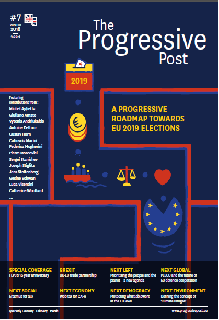Jeudi 1er février 2018
Article paru dans le Progressive Post – Numéro 7 – Hiver 2018

Given that our economies are being reshaped and challenged by the digital revolution, our policies need to evolve to deal with this new type of wealth creation. One of the big issues is how to ensure that internet companies pay their fair share of taxes. MEP Pervenche Berès explains why this and other related issues are so important and what can be done about them.
Recently, the big tax debate has been about tax avoidance, whereby companies rely on complex structures and legal weaknesses to avoid paying their fair share of taxes. Tax advisers and tax havens are at the centre of these practices. But lately, another issue has arisen: how does one tax digital companies at all? And that leads to another question: what impact does digitalisation have on tax collection?
Currently, companies are taxed where they are located. However, with the digital economy, the physical presence of a company in countries where it operates and makes profits is not required: this is exemplified by the ‘GAFA’ (Google, Apple, Facebook & Amazon), which make enormous profits all around the world but are only located in few low tax countries.
“ In 2014, Apple paid tax at 0.005% in Ireland, where the low statutory tax rate is set at 12.5%.
The S&D group has been campaigning for taxes on profits to be paid where the profits are made. This would ensure a level playing field for all: why should the baker around the corner of the street pay more taxes than a company making billions? Here we recall that taxation is used to finance public goods! That means schools, hospitals, public libraries, roads, airports and network infrastructure. When a company evades taxation, it directly erodes national and EU budgets that it has been benefiting from without paying for and erodes citizens’ public services and social protection.
The mistakes
Taxation mainly remains in the hands of Member States. Here lies mistake 1. Whenever the EU talks about taxation, the European Parliament has in principal no co-decision power and is blocked by Member States (the Council). Yet most of the political pressure that has pushed for reform at international level has come from this institution.
Mistake 1 is coupled with 2: the unanimity rule on tax issues at the Council, which is basically a veto power in the hands of the most reluctant Member States.
We are talking about an international issue, which cannot be fixed at the national level. This has led to mistake 3: some countries argue that it can only be fixed at the level of the OECD (Organisation for Economic Cooperation and Development). But, the OECD has its limits, as the US – home country of GAFA – is blocking any breakthrough. We believe that the EU should pave the way in order to allow the OECD to move forward.
The solutions
The European Commission has made a step by using competition policy to tackle the practices of multinational companies that are trying to abuse tax systems. Nobody can dispute the fact that Commissioner Vestager is doing a great job! But that is only one side of the coin.
The Commission published a useful communication last September that was supposed to feed the reflection process of Member States, which published a somehow empty common position in December.
The Common Consolidated Corporate Tax Base (CCCTB) currently under discussion offers an opportunity for a temporary solution for those companies within its scope that should not be undermine. In the long run, we need to look at the roots of taxation: the concept of “permanent establishment” must incorporate the digital world. The place where the profits are generated should replace the localisation of the company as the main parameter to determine where and by whom a company should be taxed.
And here we stand: how do we change international tax rules when all the Members States of the EU and member countries of the OECD are not truly willing to move? The Treaty on the functioning of the EU (TFEU) offers the Commission (article 116) a weapon through which the Commission could sweep away the unanimity rule by using the ‘distortion of competition’ argument.
Will they use it? Will the European Parliament succeed in leading the political pressure to ensure a fairer and modern tax system across the UE? That’s where we stand. That’s our goal for 2018 because fair taxation matters.
